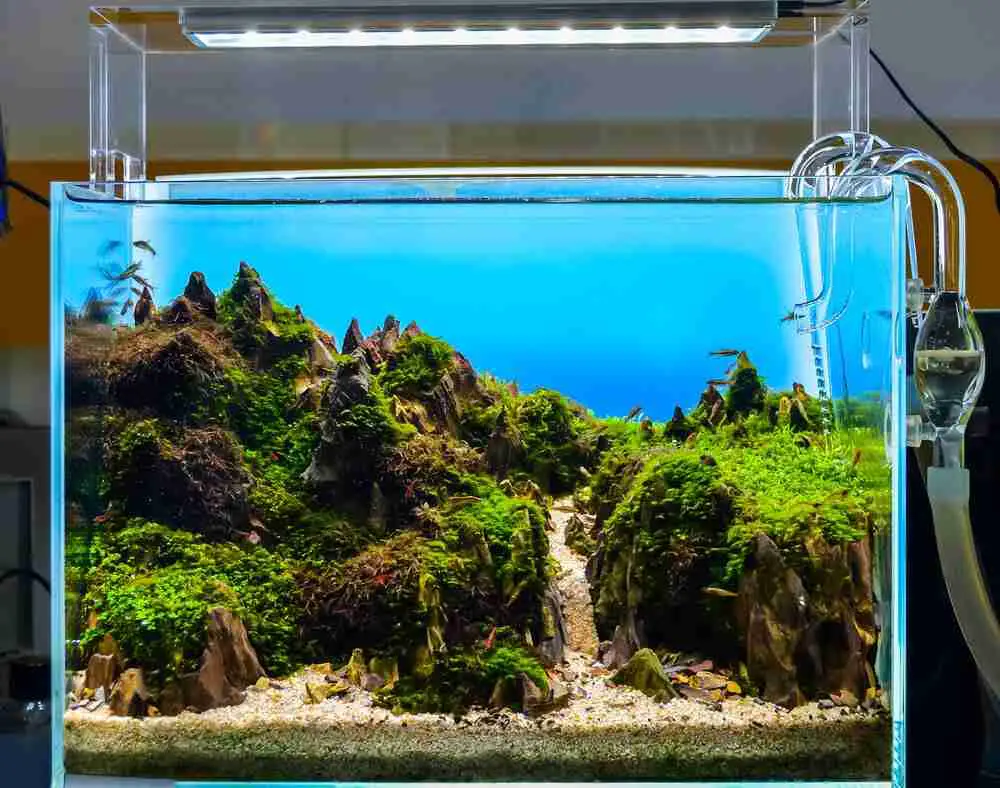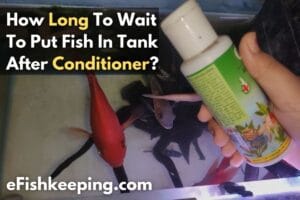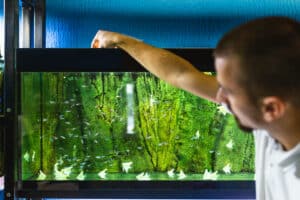Are you constantly refilling your fish tank water, yet struggling to figure out why it evaporates so quickly? Then you’re at the right place!
In this blog post, I will share with you the 6 most common reasons why your fish tank is evaporating so fast and the fixes to the issue. So without further ado, let’s dive in!
Why Does Your Fish Tank Water Evaporate So Fast And Fixes:
#1. Water Temperature
Water temperature is one of the key factors that can cause the water in your fish tank to evaporate more quickly.
If the water in your tank is too warm, it can cause the molecules to move faster and become more active. This increased activity can cause the water to evaporate more quickly, which means you’ll need to refill your tank more frequently.
SOLUTION:
It’s possible that your aquarium heater is set at a higher temperature than it should be. It’s a good idea to check the temperature and reduce it if it’s too high. Keep the water temperature suitable for the fish in the tank.
#2. Humidity
Evaporation is like a magic trick where water molecules transform from liquid to gas and disappear into the air, leaving behind a lower water level in the fish tank.
The rate of this disappearing act depends on the temperature and humidity of the surrounding air.
When the air is thick with moisture, or high in humidity, the water molecules have a harder time escaping into the air. It’s like trying to fit one more person in a crowded elevator. There’s just no room left.
On the other hand, when the air is dry, or low in humidity, the water molecules have an easier time slipping away.
It’s like trying to find a spot in a nearly empty elevator. There’s plenty of room to move around.
In short, the humidity in the air plays a crucial role in how quickly the water in your fish tank evaporates. High humidity puts on the brakes, while low humidity gives it the green light.
Note: Usually, in winter months the air is less humid (as you will find the air mostly dry) – so you are more likely to observe water evaporation than the summer months.
SOLUTION:
Use humidifiers to control the humidity levels of your room. A humidifier can be the perfect case to keep your fish tank water from evaporating too fast.
A humidifier works by adding moisture back into the air, making it more difficult for the water in your fish tank to escape.
You can place the humidifier close to the fish tank or in the room where the fish tank is located. Some humidifiers come with adjustable settings, so you can control the level of humidity in the room as per your need.
I recommend you get a humidifier like this one available on Amazon.
#3. Water Movements
Water movement in a fish tank can play a big role in how quickly the water evaporates.
When the water is moving around a lot, it creates a lot of surface agitation. This agitation causes more water molecules to be exposed to the air, which increases the rate of evaporation.
SOLUTION:
A solution to this problem is to reduce the flow of equipment that can create water movement in the tank. This can include things like air stones, sponge filters or powerheads.
By reducing the flow of these equipment, you can slow down the water movement and reduce the evaporation rate.
Another solution is to place the fish tank in a location where there is less air movement. If there is a lot of movement in the room, such as from a fan or air conditioning, it can cause the water to evaporate more quickly.
Additionally, you can also reduce the amount of time the equipment is on, or use different equipment that can run without creating much water movements, to minimize the agitation caused to the water.
#4. Lighting
The more light there is shining on the water, the more heat is generated, and the more the water molecules move around, causing the water to evaporate faster.
SOLUTION:
One solution is to keep the lights on for only a certain period of time in a day. A good rule of thumb is to keep fish tank lights on only for 8 – 12 hours a day. For the rest of the day, you can allow complete darkness.
And if you are wondering about using moonlights for your aquarium, please read this post.
Another solution is to use less powerful lights in your tank, so that they have less impact on the water temperature and evaporation rate.
#5. Tank Surface Area
The surface area of a fish tank can have a big impact on how quickly the water evaporates. The larger the surface area of the water, the more water molecules are exposed to the air, and the faster the water will evaporate.
Flat-shaped horizontal and large sized aquariums are more likely to cause evaporation because they have a larger surface area of water compared to tall and small-sized aquariums.
SOLUTION:
One way to solve this issue is to use medium-sized or small-sized aquariums if you are too concerned about water evaporation.
#6. Fish Tank Type
The type of fish tank you have can also affect the rate of water evaporation. An open fish tank, one that does not have a lid or cover, is more likely to cause water evaporation at a faster rate than a closed fish tank.
I highly suggest you check out this blog post to see the pros and cons of covered and uncovered fish tanks.
SOLUTION:
A solution to this problem is to use a lid or cover on your fish tank. This will help to slow down the evaporation rate.
Lastly – Ensure That There Are No Leaks In The Tank
If none of the above-mentioned causes apply to your situation and still you notice tank water evaporating at a faster rate – be sure to check for signs of leaks or cracks in the fish tank.
A slight hairline crack or leak between the tank walls can also cause the water level to go down gradually (which you might mistake as water evaporation).
So inspect the tank from every corner to see signs of cracks. If needed, you can temporarily put fish in a different location so that you can do the inspection more thoroughly.
Is It Normal If Your Fish Tank Water Evaporates Fast?
Well, it’s not uncommon to notice the water level in your fish tank going down over the course of a few days. But, if you suddenly notice a significant drop in water level in just one or two days, it’s time to investigate the cause!
From temperature, humidity, and water movements, there are many factors that could be responsible for the issue. With a little detective work, you can identify the culprit and take steps to fix the problem.
So, don’t be afraid to dive in and figure out what’s causing your fish tank water to evaporate at an alarming rate. It’s all a part of fish tank maintenance!
How Much Evaporation Is OK For A Fish Tank?
Here’s a rough estimate of how much water you’d lose through evaporation everyday..
| Tank Size | Water Loss Due To Evaporation: |
| 50 gallons | 0.5 gallons every day |
| 100 gallons | 1 gallons every day |
| 120 gallons | 1 – 1.5 gallons every day |
| 300 gallons | 2 – 2.5 gallons every day |
As a general rule of thumb, you can expect 1/2 a gallon of water loss due to evaporation for every 50 gallon of water volume.
Please note that all these are just a general guideline. The exact water loss due to evaporation can vary on several different factors like humidity, temperature, and more as we discussed earlier.
How Often Should I Add Water To My Fish Tank?
Short Answer: Every week while doing water change – also top off the water that is lost through evaporation.
Let’s say you have a 50 gallon tank and water loss due to evaporation is half a gallon daily. So in a week it turns out to be 3.5 gallons of water loss.
Now in the aquarium hobby, the recommendation is to change around 10% – 15% of water every week.
After 1 week, the water left in a 50 gallons tank would be around 50 – 3.5 = 46.5 gallons.
And 10% of 46.5 gallons is 4.65 gallons ( ~ 5 gallons).
So each week, you will be changing around 5 gallons of dirty tank water with clean and fresh water. Along with that, you will have to add (top-off) 3.5 gallons of water to restore the tank water level to its original levels.
Remember that topping off is not a complete replacement for water change.
Topping off a fish tank refers to adding water to the tank to replace water that has been lost due to evaporation. While topping off can help maintain the water level in a fish tank, it does not replace the need for regular water changes.
When water evaporates only the water from the tank goes away. The dirt and impurities of the fish tank still remain inside the tank ecosystem.
So if you simply keep topping off the tank it would be challenging to keep the tank free from impurities and excess nutrients that gets collected in the tank.
Water changes are necessary because as fish produce waste and other organic matter breaks down in the tank, the levels of dissolved toxins such as ammonia, nitrite, and nitrate can rise. These toxins can be harmful to fish and other aquatic life in the tank.
Regular water changes remove some of these toxins and also replenish important minerals and other dissolved substances that are necessary for the health of the tank’s inhabitants.
How To Add Water To Your Tank After Evaporation?
As evaporation occurs, it’s important to add fresh water to your tank to maintain the perfect balance for your aquatic friends. Here are a few tips for doing just that:
First and foremost, always use a water conditioner like Seachem Prime before adding new water to your tank. This will remove any harmful chemicals or impurities that may be present in tap water.
See Related: How Long To Wait To Put Fish In Tank After Conditioner?
Slowly pour the new water into your tank, being careful not to disturb any of the decorations or inhabitants. A small pitcher works great for this task.
Finally, check the temperature of the new water before adding it to the tank. It should be the same temperature as the water already in the tank to avoid any shock to the fish
Using Auto Top Off Tool For Auto Refilling Tank Water
Auto top off equipment, also known as ATO systems, are a great solution for those who have a large tank and are tired of constantly refilling the water due to evaporation.
These systems automatically monitor the water level in your tank and add water as needed, keeping the water level at a consistent height.
If you are looking for getting an ATO system, I recommend checking out this Hygger Aquarium Auto-Top Off Kit (available on Amazon).
Watch this video to learn more about how Auto-Top off systems work:
Wrapping Up
In short, there are several reasons why fish tank water evaporates, including temperature, water movements, and more. It is important to understand these factors and take steps to prevent or fix them in order to maintain a healthy and stable environment for your fish.
If you found any value in this post please share it with others. You can also join me on YouTube (search with name eFishkeeping). Thanks and happy fishkeeping!
Suggested Reading: Can You Use Aquarium Water For Plants?
Hi! I’m Praveen Ghoshal, the founder of eFishkeeping.com. Inspired by my Dad, I got interested in fishkeeping when I was a kid. Since then, I have been involved with this hobby. Currently, I have 3 fish tanks at our home, and I enjoy this hobby with my full family. Read more about me here.







